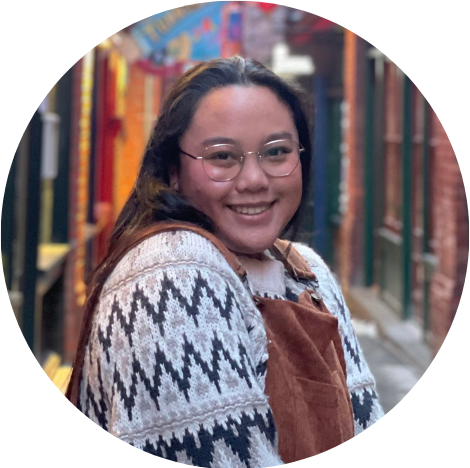Divine Reyes is a second-generation Filipinx-Canadian. She was born and raised on the unceded and ancestral territories of the Musqueam, Squamish, and Tsleil-Watuth nations. Divine is graduating with a major in Gender, Race, Sexuality & Social Justice and an ACAM minor. She further pursued her passion for social justice through her undergraduate degree. It opened up her love for feminism and activism and learned how they intersect within Asian and racialized communities through her ACAM courses. Divine is looking forward to working within the community and further applying the knowledge and abilities she’s obtained from her degree in the field of social work.
What drew you to the ACAM program and why did you declare it as a minor?
I learned about the ACAM faculty when I was taking GRSJ 328 with JP where he mentioned the ACAM program. I started to look into it and realized that some of my GRSJ courses aligned with the ACAM minor. So I decided to apply for it. However, Dr. Laura Ishiguro’s ACAM 300 class really drew me into the program. I learned so much about individual and community-oriented Asian Canadian histories and how important and relevant they are, especially in relation to the histories we are making right now.
How has ACAM impacted you or the people around you? What connections and ideas were you able to foster through ACAM?
Being in ACAM classes and joining the program, I was able to meet like-minded people and have really inspiring and impactful conversations inside and outside of the classroom. I was also able to create meaningful friendships through ACAM classes. Adding onto that, taking ACAM courses have allowed me to also build on being self-reflexive, taking into account where and how I am positioned in relation to the land, environment, and community that I am situated in. ACAM has also helped me to understand my experiences being a Filipinx-Canadian and what that entails. While there may be people in either the Filipinx community or Canadian society who may not accept all of me, I know that there are people who feel the same way as me. Being Asian Canadian and Filipinx-Canadian is it’s own identity and should not be forced in a box or a single definition. Thus, ACAM helped me embrace my identity, to be proud of what I have done and who I am, and feel included in community.
What was your favourite ACAM memory or course?
I learned so much from and enjoyed taking ACAM 300 with Dr. Laura Ishiguro. Learning about the individual histories that I am connected with and that are connected to the places and/or environments where we are also making history opened my eyes to the longer connections that I have with the past; that the activism I carry, I am not alone in. There are people I can look up to who I can relate to and I am part of other communities who feel and fight for the same things as me.
Have you completed any ACAM-related projects? What was this experience like?
I created a mock e-zine for ACAM 250. It is about my experience being a Filipinx-Canadian and dealing with feelings of not belonging. There were also two research papers that I have done about Filipinx history in Canada and I learned so much from that. The first one is about the first known Filipinx migrant to British Columbia, Benson Flores, and I explored his story’s importance in our history. The second is a project I made in ACAM 300, where I parodied songs that explain the migration history of Filipinxs in Canada. I feel like the song parody project really gave me a newfound appreciation for Filipinx Canadian history and I learned information that I never knew about.
What is one piece of advice you would give to your first-year self?
One thing that I would advise my first-year self is to just pursue their passions. While there is external pressure that you may have been put under, ultimately, what’s most important is that you choose the path that you feel the most excited about; don’t choose it because it feels safe or it’s something that other people want you to do. As long as you are doing it for you and you know that it will help you, make you happy, and also challenge you (in a good way), then that is what matters.
What are you most looking forward to in the future?
I am looking forward to working close with communities to make on-the-ground change. I want to take what I have learned and apply it to the jobs that I will take and do it in a way that may change someone’s life for the better. I am truly excited to practice what I have gathered in my undergrad and enact it in my everyday life, but most importantly I am excited to be on a path that may lead to the field of social work so that I may continue to make a difference in the community, even if it is in small ways.
 Faculty of Art
Faculty of Art
